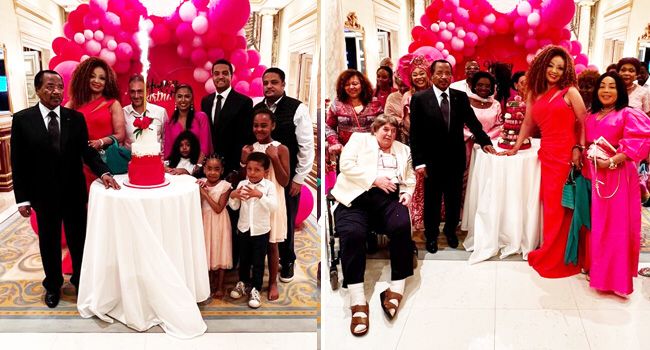Flamboyant First Lady celebrates 52nd birthday, stays mute on 6-year-old conflict in Anglophone regions

By Wilson Musa
Every December 4th marks a special day in the life of Cameroon’s First Lady, Chantal Biya because it is her birthday! She marked this year’s celebration by visiting the National Institute for children living with disabilities where she offered them gifts and presents and a celebration with family at the Unity palace. While this is laudable, it goes without saying that Mrs. Chantal Biya has forgotten about Internally Displaced Persons from the North West and South West regions and Anglophone Refugees in Nigeria.
Since 2016, the Cameroon government responded in a brutal way to protests by Common Law Lawyers and Anglophone teachers, arresting, torturing, and using live bullets on them. This caused the reaction from abled young men from the Anglophone regions to pick up arms to fight the central government in what will later be termed the fight for freedom and independence.
Six years later, the First Lady who is UNESCO’s goodwill Ambassador has never addressed the issues of Anglophone Refugees and IDPs. Whereas the President accompanied by First Lady Chantal Biya visited the 2012 flood victims in the far north region, providing them with humanitarian assistance. The Presidential couple has on several other occasions donated humanitarian support and wished victims of natural disasters their heartfelt compassion.
Is the armed conflict in the former British Southern Cameroon a hot topic for Mrs. Chantal Biya, not to talk about? Even the humanitarian sector? These are questions that many have asked but with no response.
In other countries like Nigeria, the First Ladies, often voice out their minds during critical national issues especially when it concerns women and children. In 2014 when 274 girls from Chibok in Nigeria were kidnapped, Mrs. Goodluck Jonathan, lamented on the whereabouts of the girls, “There is God oh, there is God, oh, the blood we are shedding, there is God oh,” she said crying in front several women who attended an emergency meeting she convened.
Opinions are high that First Ladies sometimes wield power while their Kings on thrones listen to them when they give their opinions. Why then has Cameroon’s First Lady not shown the example by whispering in the ears of President Pual Biya to end the ongoing armed conflict that has taken away thousands of lives and destruction of properties?
Born on December 4th, 1970 as Chantal Pulcherie Vigouroux in the East region to the French expatriate George’s Vigouroux and Rosette Ndongo Mengolo, Chantal Biya spent most of her adolescent life in Yaounde.
She got married to President Paul Biya on 23rd April 1994, after his first wife Irene Biya died in 1992.
Considered one of the most influential women in Africa, Chantal Biya has established several charitable organizations namely; The Chantal Biya Foundation which was created in 1994 to raise national and international awareness in the fight against poverty, diseases, misery, and all types of exclusion in urban and rural areas. Also, African Synergy pursues various HIV/AIDS initiatives amongst other organizations.
The First Lady has hosted high-level events such as the First Ladies Summit in Yaounde during the 1990 Organisation of African Unity Summit, Jeunes Active pour Chantal Biya, and the Chantal Biya International cycling tour. But she has not considered addressing the armed conflict in the Anglophone regions.
Mrs. Chantal Biya is famous for her signature hairstyle style called “banane” and has also popularised other styles; collectively, they are known as the Chantal Biya.

In November 2010, Bertrand Teyou published a book titled, “Chantal Biya, from the streets to the palace” tracing Biya’s rise from humble origins to becoming First Lady.
However, he was given a two-year prison term on charges of “insult to the character” and organizing an “illegal demonstration” for attempting to hold a public reading.
Amnesty International and International PEN’s Writers in Prison Committee both protested his arrest and issued appeals on his behalf. He was freed on 2 May 2011 when a well-wisher agreed to pay his fine so that he might seek treatment for his worsening health condition.




